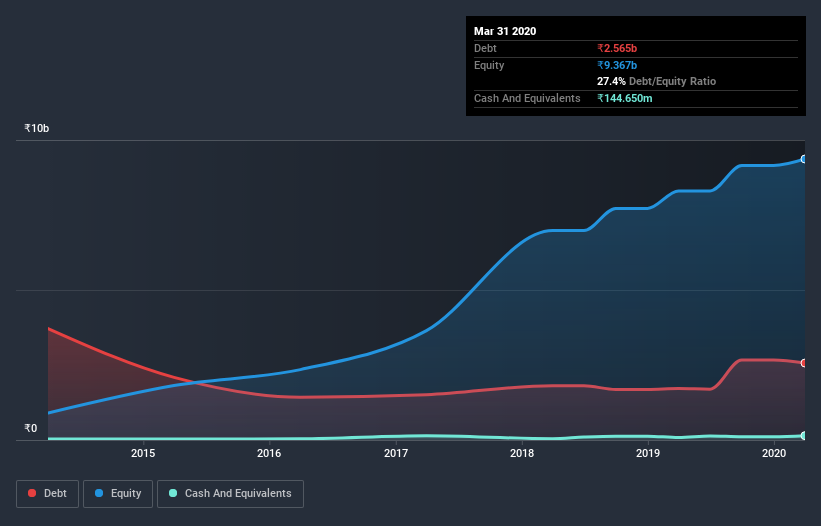Bodal Chemicals (NSE:BODALCHEM) Has A Somewhat Strained Balance Sheet

Legendary fund manager Li Lu (who Charlie Munger backed) once said, 'The biggest investment risk is not the volatility of prices, but whether you will suffer a permanent loss of capital.' When we think about how risky a company is, we always like to look at its use of debt, since debt overload can lead to ruin. We can see that Bodal Chemicals Limited (NSE:BODALCHEM) does use debt in its business. But is this debt a concern to shareholders?
When Is Debt A Problem?
Debt is a tool to help businesses grow, but if a business is incapable of paying off its lenders, then it exists at their mercy. Part and parcel of capitalism is the process of 'creative destruction' where failed businesses are mercilessly liquidated by their bankers. While that is not too common, we often do see indebted companies permanently diluting shareholders because lenders force them to raise capital at a distressed price. By replacing dilution, though, debt can be an extremely good tool for businesses that need capital to invest in growth at high rates of return. The first step when considering a company's debt levels is to consider its cash and debt together.
Check out our latest analysis for Bodal Chemicals
What Is Bodal Chemicals's Net Debt?
As you can see below, at the end of March 2020, Bodal Chemicals had ₹2.57b of debt, up from ₹1.71b a year ago. Click the image for more detail. However, it also had ₹144.7m in cash, and so its net debt is ₹2.42b.

A Look At Bodal Chemicals's Liabilities
According to the last reported balance sheet, Bodal Chemicals had liabilities of ₹4.95b due within 12 months, and liabilities of ₹383.4m due beyond 12 months. Offsetting this, it had ₹144.7m in cash and ₹4.64b in receivables that were due within 12 months. So its liabilities total ₹541.5m more than the combination of its cash and short-term receivables.
Of course, Bodal Chemicals has a market capitalization of ₹9.02b, so these liabilities are probably manageable. However, we do think it is worth keeping an eye on its balance sheet strength, as it may change over time.
We measure a company's debt load relative to its earnings power by looking at its net debt divided by its earnings before interest, tax, depreciation, and amortization (EBITDA) and by calculating how easily its earnings before interest and tax (EBIT) cover its interest expense (interest cover). Thus we consider debt relative to earnings both with and without depreciation and amortization expenses.
Bodal Chemicals's net debt to EBITDA ratio of about 1.6 suggests only moderate use of debt. And its commanding EBIT of 11.4 times its interest expense, implies the debt load is as light as a peacock feather. It is just as well that Bodal Chemicals's load is not too heavy, because its EBIT was down 44% over the last year. When it comes to paying off debt, falling earnings are no more useful than sugary sodas are for your health. The balance sheet is clearly the area to focus on when you are analysing debt. But it is Bodal Chemicals's earnings that will influence how the balance sheet holds up in the future. So when considering debt, it's definitely worth looking at the earnings trend. Click here for an interactive snapshot.
But our final consideration is also important, because a company cannot pay debt with paper profits; it needs cold hard cash. So it's worth checking how much of that EBIT is backed by free cash flow. Over the last three years, Bodal Chemicals saw substantial negative free cash flow, in total. While investors are no doubt expecting a reversal of that situation in due course, it clearly does mean its use of debt is more risky.
Our View
While Bodal Chemicals's conversion of EBIT to free cash flow makes us cautious about it, its track record of (not) growing its EBIT is no better. But at least its interest cover is a gleaming silver lining to those clouds. When we consider all the factors discussed, it seems to us that Bodal Chemicals is taking some risks with its use of debt. While that debt can boost returns, we think the company has enough leverage now. There's no doubt that we learn most about debt from the balance sheet. However, not all investment risk resides within the balance sheet - far from it. Take risks, for example - Bodal Chemicals has 3 warning signs we think you should be aware of.
If you're interested in investing in businesses that can grow profits without the burden of debt, then check out this free list of growing businesses that have net cash on the balance sheet.
If you decide to trade Bodal Chemicals, use the lowest-cost* platform that is rated #1 Overall by Barron’s, Interactive Brokers. Trade stocks, options, futures, forex, bonds and funds on 135 markets, all from a single integrated account. Promoted
Valuation is complex, but we're here to simplify it.
Discover if Bodal Chemicals might be undervalued or overvalued with our detailed analysis, featuring fair value estimates, potential risks, dividends, insider trades, and its financial condition.
Access Free AnalysisThis article by Simply Wall St is general in nature. It does not constitute a recommendation to buy or sell any stock, and does not take account of your objectives, or your financial situation. We aim to bring you long-term focused analysis driven by fundamental data. Note that our analysis may not factor in the latest price-sensitive company announcements or qualitative material. Simply Wall St has no position in any stocks mentioned.
*Interactive Brokers Rated Lowest Cost Broker by StockBrokers.com Annual Online Review 2020
Have feedback on this article? Concerned about the content? Get in touch with us directly. Alternatively, email editorial-team@simplywallst.com.
About NSEI:BODALCHEM
Bodal Chemicals
Engages in the manufacture and sale of dyestuffs, dyes intermediates, and other chemicals in India.
Undervalued with reasonable growth potential.

